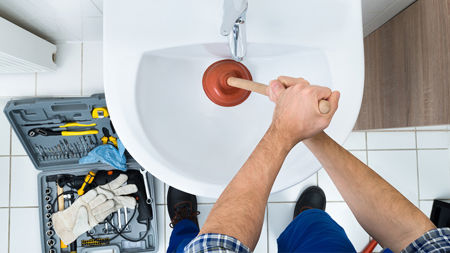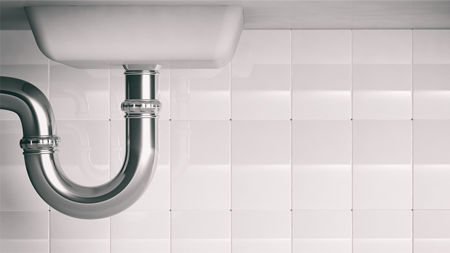Is your bathroom sink giving off a strange smell? Don’t worry - you’re not the only one dealing with this unpleasant surprise. A smelly sink is a common problem in many homes and is usually caused by a build-up of grime, blocked pipes or stagnant water in the drain. The good news? It’s often quick and easy to fix.
In this blog, we’ll explore the most likely causes of a smelly bathroom sink and walk you through simple steps to freshen things up, so no need to call in a plumber just yet!
Why does my sink smell?
A smelly sink is usually caused by bacteria build up from grease, fat and food which have been flushed down the drain. These will then get stuck in the pipes causing the familiar rotten egg smell. In bathrooms, a smelly sink can often be caused by stray hairs that become lodged in soap scum that starts to line the drain.
What causes a foul sink odour?
A smelly sink drain is usually induced by a build up of oils and food products that are stuck in the drain. They absorb or block water passing through and begin to create a foul sink odour that doesn’t dissipate until the drain is cleared. You might need to check whether you are doing all of these steps when cleaning a bathroom?
How to stop your sink drain from smelling
To stop your sink from smelling, you will need to clear any blockages which are causing the smell. Below are our top methods for clearing the drain and getting rid of those nasty smells for good.
Using boiling water
Using a plunger
Using white vinegar
Using caustic soda
Checking the u-bend
Using boiling water
Boil the kettle then pour some hot water down the drain. Wait for five minutes then pour an equal amount of cold water down. This should force any remaining grease to congeal and hopefully clear the blockage and the smell.
Using a plunger
Using a plunger can also help clear a smelly drain. Simply place the plunger cup over the basin drain and pump vigorously up and down for at least a minute to remove any small blockages. Finally, repeat the boiling water flush to remove any remaining congealed build up. Be sure to have your plunger handy just in case!

Using white vinegar
Another simple way to clear your sink drain is with a small amount of white vinegar. Pour a cup of white vinegar down the drain, let it stand for 30 minutes, then rinse with hot water.
Using caustic soda
Caustic Soda, (Sodium Hydroxide), is also very effective for unblocking sinks and plugging holes. This substance has fantastic degreasing properties meaning it can break down grease and fat, which are the most common cause of a blocked drain.
To unblock a sink using Caustic Soda, we would recommend using a solution of around 10%. To create a 10% solution of Caustic Soda, simply dissolve 100g of (Caustic Soda) Sodium Hydroxide crystals into 1 litre of water.
Simply pour the 10% solution down the drain and let it get to work, it is recommended to leave caustic soda to work its magic for around half an hour to break down any deposits in the sink. When 5 minutes have passed, slowly run some water into the sink, increasing the water pressure.
If it isn’t clear, repeat the process of creating a solution and pouring it down the sink until the drain appears to be clear. Caustic Soda can also be used to effectively unblock plug holes, outdoor drains and toilets.
Be aware that caustic soda is a hazardous substance and can irritate the sink and eyes after direct contact. If you're trying this method, ensure you use gloves and have eye protection to prevent any injuries or try another method if you're wary of the risks.
Need more bathroom hacks? Here's how to unblock a toilet with ease.
Check the u-bend
If these methods do not resolve the issue, it may be that there is a blockage in the U-Bend of your sink. U-bend traps, or waste pipes, are found underneath the plug hole of bathroom basins and baths.
A U-Bend waste tube is usually filled with water to prevent drain odours from escaping. The easiest way to clear an obstructed U-Bend is to remove any blockages from it. This can be done by carefully removing the u-bend pipe using a wrench and emptying the containing water. With the aid of a wire brush and a flush of warm water, any remaining residue can be easily swept away.

How to prevent your sink from smelling
Dom Lees Bell, bathroom expert at Drench advises: "Preventing odours and blockages in a bathroom sink comes down to routine care, and being extra vigilant with what you are putting down the drain. Regularly rinsing with hot water, clearing debris from the drain and ensuring the trap remains free of build-up are all essential steps to keep unpleasant smells at bay. You can also opt for a waste with hair catching properties to prevent things like hair, soap scum and other solids from making their way into the drain."
The above methods every week or two should prevent the drains in your home from developing any nasty residue that can congeal and form an unpleasant smell. If a smelly drain is something of a persisting issue, it might be worth seeking professional advice from a plumber as it could be due to an external issue rather than an internal issue.







